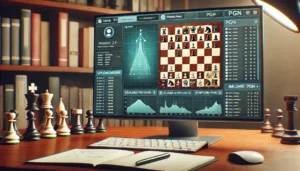Introduction
In the modern era of chess, computer analysis has become an invaluable tool for players of all levels. By using powerful chess engines and analysis tools, you can gain deep insights into your games, understand your mistakes, and improve your overall performance. In this article, we will explore how to analyze your games, understand engine recommendations, and utilize common analysis tools effectively.
Key Takeaways
- Learn how to analyze your chess games using computer tools.
- Understand the recommendations provided by chess engines.
- Familiarize yourself with common analysis tools to enhance your chess skills.
Outline
- How to Analyze Games
- Importing and reviewing games
- Identifying critical moments
- Evaluating your moves and plans
- Understanding Engine Recommendations
- Deciphering engine evaluations
- Learning from suggested moves
- Recognizing patterns and common mistakes
- Common Analysis Tools
- Popular chess engines and interfaces
- Online platforms for analysis
- Integrating analysis into your training routine
How to Analyze Games

Analyzing your own games is a crucial step in improving your chess skills. Here’s how to effectively analyze your games using computer tools:
- Importing and Reviewing Games Start by importing your games into a chess analysis program or platform. Many online platforms allow you to upload PGN files (Portable Game Notation) of your games. Once uploaded, review the game move by move to identify key moments and critical positions.
- Identifying Critical Moments Look for critical moments in your games where the evaluation changes significantly. These are points where you or your opponent made mistakes or missed opportunities. Use the computer analysis to pinpoint these moments and understand what went wrong.
- Evaluating Your Moves and Plans Evaluate your moves and plans by comparing them with the engine’s recommendations. Take note of the moves the engine suggests and understand why they are better. This process helps you learn from your mistakes and improve your decision-making in future games.
Understanding Engine Recommendations

Chess engines provide powerful insights into your games. Here’s how to make the most of their recommendations:
- Deciphering Engine Evaluations Chess engines provide evaluations in terms of centipawns (a hundredth of a pawn) or as a positive/negative number. A positive evaluation favors White, while a negative evaluation favors Black. Understanding these evaluations helps you gauge the advantage or disadvantage in various positions.
- Learning from Suggested Moves Study the moves suggested by the engine and try to understand the reasoning behind them. Analyze how these moves improve your position, create threats, or defend against your opponent’s plans. This understanding helps you incorporate similar ideas into your own play.
- Recognizing Patterns and Common Mistakes Engines can help you recognize patterns and common mistakes in your games. For example, you might frequently misplace your pieces or overlook tactical opportunities. Identifying these recurring issues allows you to focus on specific areas for improvement.
Common Analysis Tools

There are numerous tools available for computer analysis. Here are some of the most popular and effective ones:
- Popular Chess Engines and Interfaces Engines like Stockfish, Komodo, and Leela Chess Zero are highly respected for their analysis capabilities. Interfaces such as ChessBase, Arena, and SCID allow you to use these engines for detailed analysis. These tools provide a robust environment for in-depth game review.
- Online Platforms for Analysis Online platforms like Chess.com, Lichess.org, and Chess24 offer built-in analysis features. These platforms allow you to upload games, use powerful engines for analysis, and access a wealth of training resources. They are convenient and accessible for players of all levels.
- Integrating Analysis into Your Training Routine Make game analysis a regular part of your training routine. After each game, spend time reviewing it with an engine, noting critical moments and learning points. Combine this analysis with other training methods, such as solving puzzles and studying master games, to reinforce your learning.
- Practical Tips for Effective Analysis
- Focus on understanding the reasons behind the engine’s suggestions.
- Look for patterns in your mistakes and work on eliminating them.
- Use the analysis to develop long-term strategic insights, not just tactical fixes.
- Discuss your analysis with a coach or fellow players to gain different perspectives.
Conclusion

By leveraging computer analysis, you can systematically improve your chess skills. Understanding how to analyze your games, interpret engine recommendations, and use common analysis tools will help you become a stronger and more strategic player. Embrace these techniques to elevate your game and enjoy the process of continuous improvement.
Visit our website chesstacticshub.com for more in-depth guides and resources to help you master every aspect of chess strategy.
